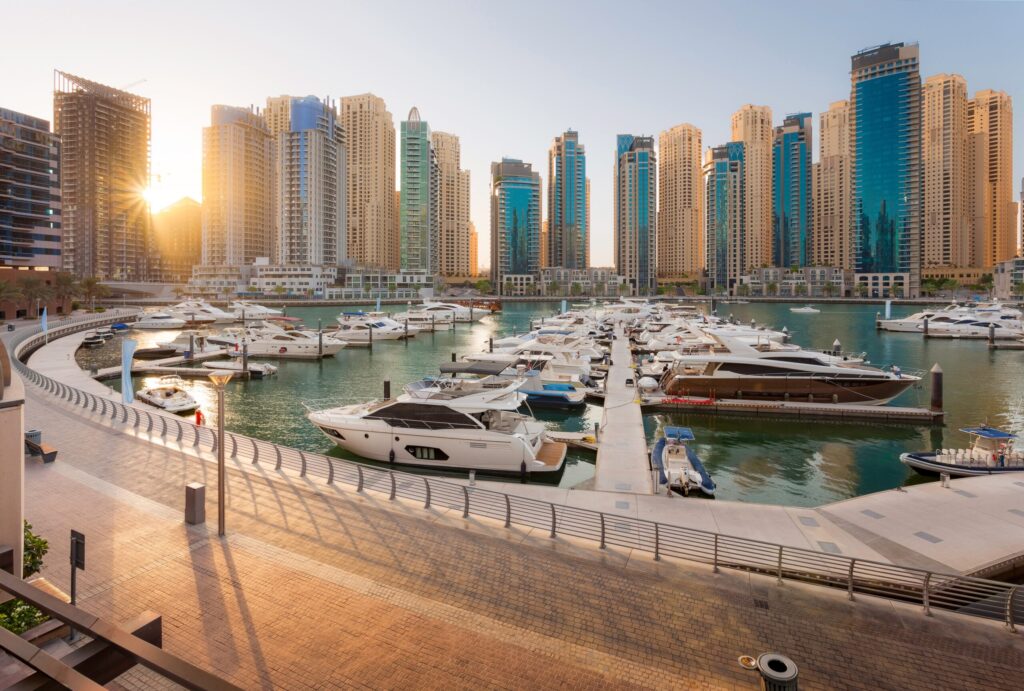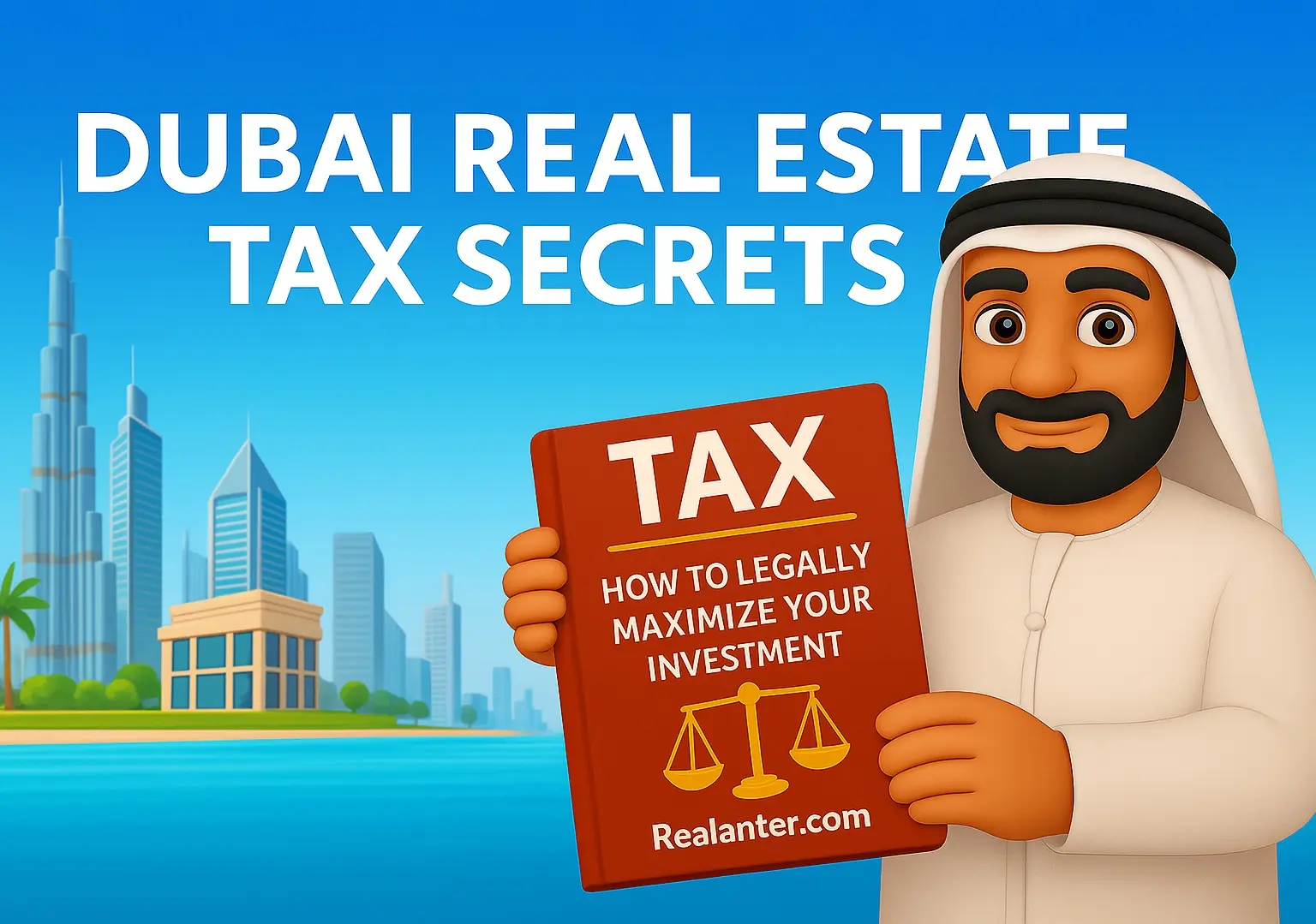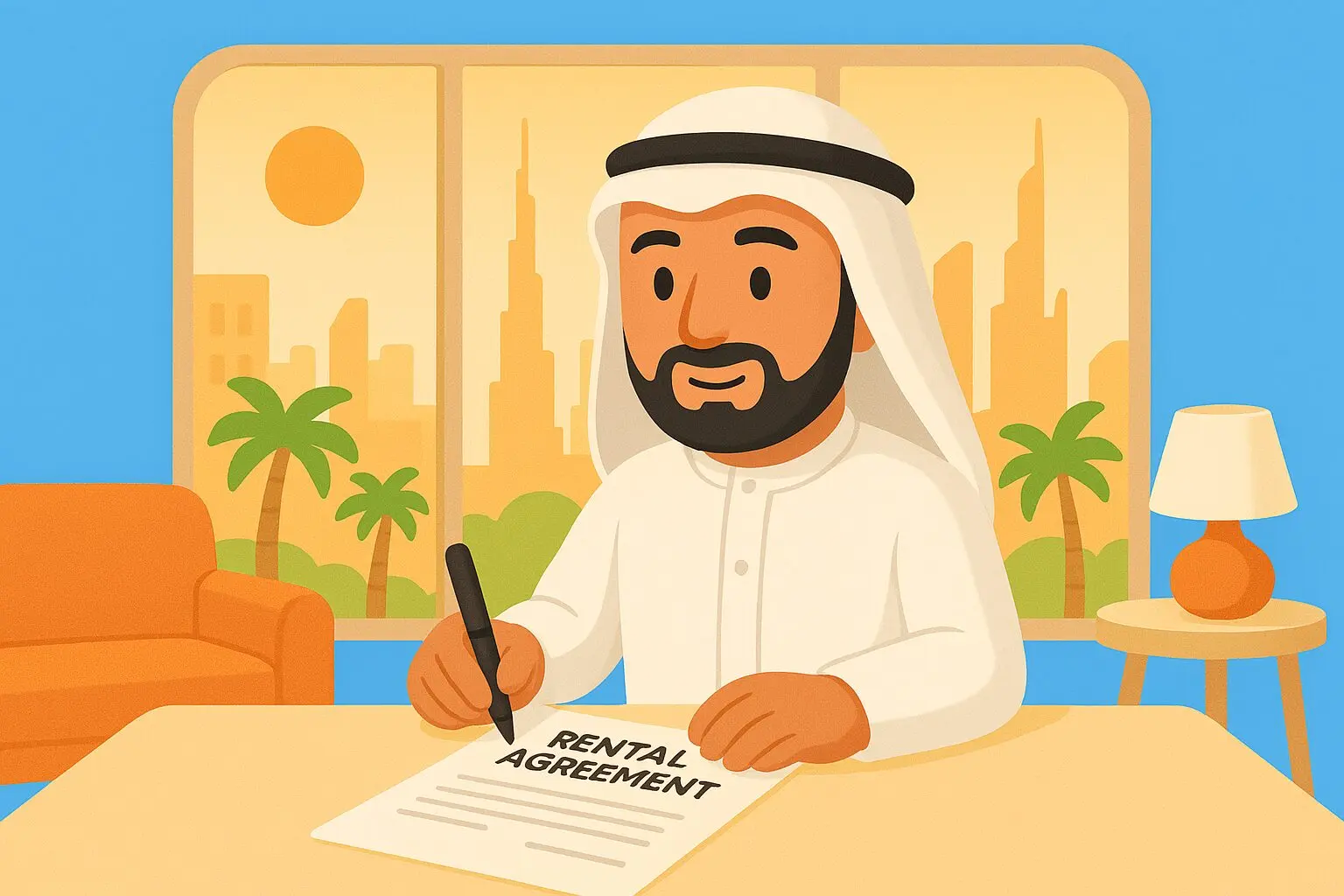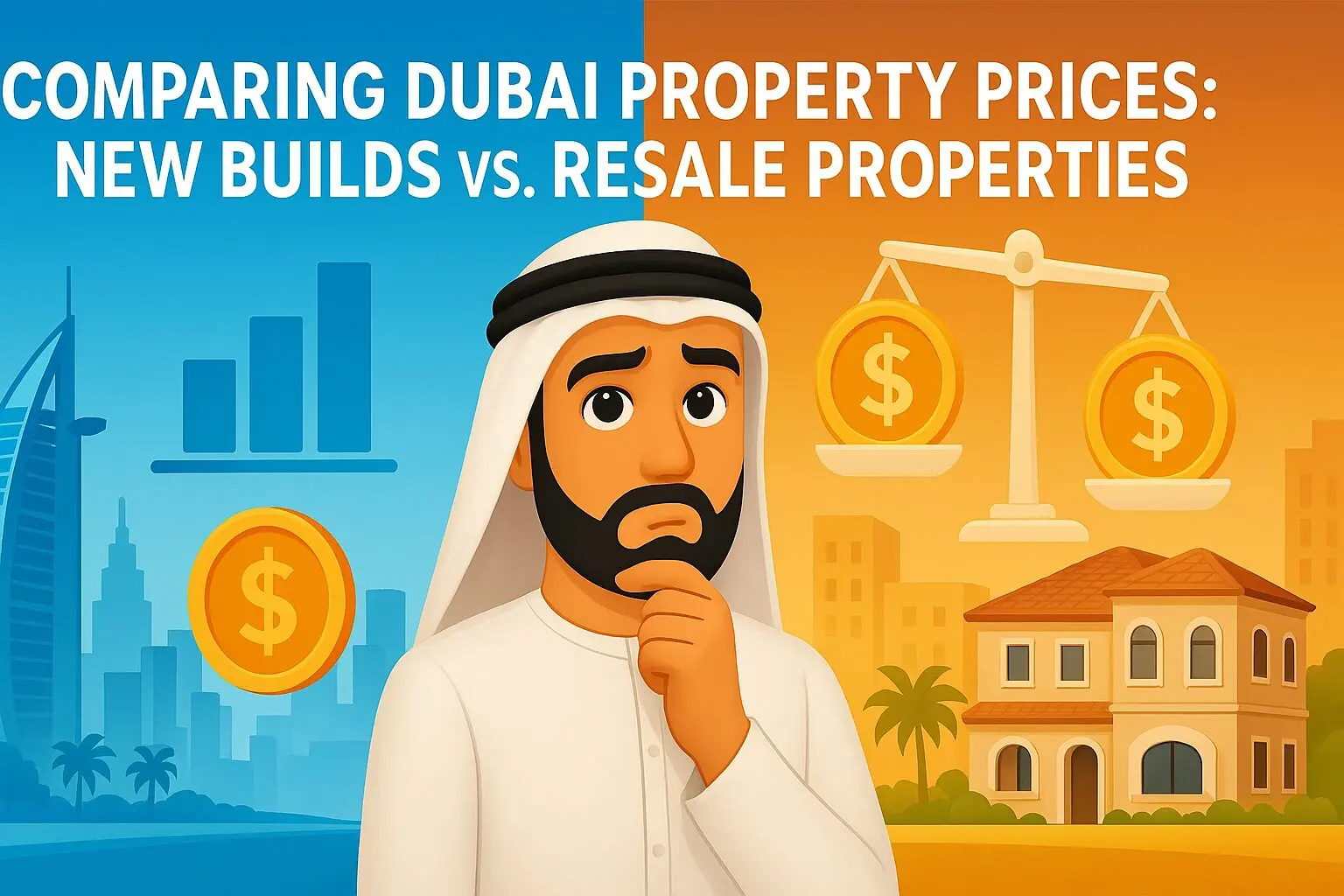Dubai has evolved into a global hub of real estate investment owing to its tax-friendly policies promising maximum returns on investments. No personal income tax, no capital gains tax, and several tax exemptions are all factors that provide investors in a thriving market generous opportunity. A better understanding of the tax benefits of Dubai will allow property owners to legally optimize their investments.
Nonexistence of Property Taxes in Dubai
One of the prime advantages of investing in Dubai real estate is that one does not pay any annual property tax whatsoever. In many parts of the world, property owners pay annual taxes based on the perceived value of assets. This cost can vary between vital and considerably, regularly diminishing net rental income.
In comparison, Dubai shares no responsibility for annual recurrent property taxation, thus allowing investors to keep their maximum profit share; on the contrary, the revenue is generated by the government through fees charged on property transactions as well as some amounts indirectly taxed and normally in such countries obtained by one-time payments, not continuous. The system alleviates the financial burden tied with property ownership in high-tax jurisdictions.
An investor acquiring property in Dubai is well set for low-cost asset management with no tax obligations every year. The nature of all this makes Dubai one of the most favorable markets in terms of real estate for investors looking for high returns without long burdens of taxes.
In the words of Mohammed Al-Farsi, a real estate lawyer at Al-Farsi & Partners, Policies for taxes in Dubai place an enormous advantage in the hands of investors. He elucidates that unlike the UK or US, rental income tax deductions and property sale taxes are awfully high, thus allowing all the profits to remain in the investors’ pockets. The absence of capital gains tax, personal income tax, and inheritance tax in the UAE are the highly favorable factors giving pull to investors around the globe.
The regulation of the Dubai Land Department also offers prospects for transparency and legal security; thus, Dubai takes top places in tax-real estate investment.
Capital Gains Tax Exemptions
Dubai allows full exemption from capital gains tax on all real estate investments, which is an important incentive towards any buyer in the property market. In capital gains in other countries, the usual range varies between 15%-30%, thus denting the bulk of an investor’s profits at the time of property sale.
If blocked from capital gains, Dubai property owners are free to sell their property without the fear of being taxed on the returns. This policy not only encourages individual real estate sales but also ensures that investors are able to retain the maximum amount from their sales. Whether you are flipping properties or simply waiting for an increase in asset value, buyers and sellers of property in Dubai benefit from a completely tax-free investments.
The exemption makes the city attractive for anyone looking to generate wealth through strategic real estate investments. With steady property appreciation in key areas such as Downtown Dubai and Palm Jumeirah, investors can lock in market growth without having to worry about taxation.
VAT Impacts on Dubai Real Estate Transactions
While Dubai offers tax-free income on real estate, Value Added Tax (VAT) applies to certain property transactions. A 5% VAT came into effect in the UAE in 2018 and applies to commercial properties rather than residential sales or leases. Buyers of newly developed residential properties from a developer may also be subject to VAT, while resale transactions remain VAT-exempt. Commercial property investors, on the other hand, must be aware of the VAT charges they accrue on leasing or selling their assets.
VAT on commercial properties is recoverable; hence, businesses could claim it in their tax returns. Knowing about VAT implications helps in informed decisions by investors, complying while achieving maximum tax efficiency. The foreign investors must additionally consider VAT registration requirements in case they engage in commercial property transactions. Although VAT exists, it is seldom imposed in Dubai, ensuring tax-free investments property ownership for residential investors.
Here’s a detailed comparison table showcasing key factors for real estate investment in Dubai versus other major global cities
| Factor | Dubai | London | New York | Singapore | Hong Kong |
| Property Price (Avg. per sq. ft.) | $300 – $700 | $1,200 – $2,500 | $1,500 – $2,500 | $1,000 – $2,000 | $2,000 – $4,000 |
| Rental Yield (%) | 6% – 8% | 3% – 5% | 2% – 4% | 2.5% – 3.5% | 2% – 3% |
| Capital Gains Tax | No | 20% | 20% | 17% | 15% |
| Personal Income Tax on Rental Income | No | 20% – 45% | 22% – 37% | 0% – 22% | 15% |
| VAT on Property Sales | 5% (new properties) | 0% | 0% | 7% | 15% |
| Foreign Ownership Restrictions | No restrictions in freehold zones | Limited | Limited | Limited | Limited |
| Ease of Buying Process | Very Easy | Moderate | Moderate | Complex | Complex |
| Regulatory Environment | Investor-Friendly | Strict | Strict | Strict | Strict |
Benefits of Investment in Real Estate in Free Zones
Foreign investors in Dubai’s free zones further benefit from additional tax advantages. Foreign investors are allowed property ownership without the encumbrance of local sponsorship, providing the investor with full control of business operations. Certain free zones further provide benefits of tax such as corporate tax exemptions and customs duty exemptions. Companies operating in these zones can therefore acquire commercial property in low tax environments, which is extremely enticing.
Free zones such as DIFC and Jebel Ali provide strategically advantageous locations for the conduct of business as well as financial incentives. Such areas lure international companies which want a tax-efficient base for their operations. Investors seeking to maximize their tax benefits should explore free zone opportunities, especially when making investments in commercial or office property. Such a model further underscores Dubai’s attractiveness as a world investment hub with flexible ownership structures.
James Cartwright, market analyst with Global Investment Insights, believes that Dubai’s tax-free environment provides it with an edge. He agrees that VAT is applicable on new property sales but points out that it is better negligible when seen against the background of heavy taxation in other major cities. Cartwright believes that the government, with several pro-investor policies, continues to back the market with sound regulations and financial incentives assuring high returns.
Therefore, Dubai’s real estate market has gained constant recognition as one of the faster-performing arena markets with long-term, tax-efficient property investments.
Tax Efficiency and Real Estate Investment Trusts (REITs)

Investors wanting tax-efficient exposure to real estate without owning directly have REITs as a very attractive alternative. They allow investors to earn rental income and capital appreciation without dealing with any property management. Dubai benefits from tax-free income distribution by its REITs, further sweetening the returns.
Maintenance costs and property management fees are also avoided in REIT investment, making it a convenient option. Publicly listed, REITs provide their investors with liquidity, something that downright property investment lacks due to the long time required to complete a sale or purchase. REITs allow investors to invest in portfolios across different properties while also enjoying the tax benefits of Dubai’s real estate sector.
Zero income tax on property investments, coupled with tax-exempt REIT dividends, stands to make this a lucrative avenue for passive income seekers. Dubai’s real estate sector offers a platter on which various REITs abound and different types of investors with different risk appetites can pick and choose.
Corporate Tax Implication in Respect of Property Owners
While Dubai does not levy a personal income tax, certain owners of property are subject to corporate tax rules. Businesses deriving rental income can now be subject to corporate tax under the evolving tax structure in the UAE.
As from January 2023, the UAE has implemented a 9% corporate tax on companies, 9% being charged on businesses that earn profit in excess of AED 375,000. This includes consideration for companies holding rental properties as a portion of their portfolio. Individual private landlords will continue to remain exempt from corporate taxes, which further preserves Dubai’s environment for investors.
Foreign companies investing in Dubai real estate must analyze their corporate tax liabilities for compliance. Structuring their investments through free zone entities and offshore companies can help in mitigating tax exposure. The imposition of corporate tax notwithstanding, Dubai remains one of the most tax-friendly environments in terms of real estate investment, especially for private investors and non-corporate entities.
Tax Issues and Compliance for Foreign-Based Investors
Foreign investors gain from Dubai interest policies toward an economy that wipes out many taxes traditionally imposed on real estate. However, one must also be aware of tax liabilities in the home country. A handful of jurisdictions impose rental taxes in Dubai on foreign rentals or require tax filings for assets abroad. These treaties should be thoroughly studied by the investors to truly benefit from taxation. Preventing double taxation is an agreement that many countries have entered into with the UAE, such as India and the UK, so no investor should be subjected to tax twice for the same income. Consulting tax advisors who are conversant with all international real estate investments would help navigate these intricacies for foreign buyers. The tax-free investments nature of Dubai’s real estate market continues to hook investors, albeit they should be mindful of tax regulations in their home country to optimize returns.
Sarah Bennett, a senior property consultant at Elite Dubai Realty, mentions that Dubai certainly has its own allure for foreign investors. “Besides the obvious advantages of being in a designated freehold area that allows for full foreign ownership without any other levies, this in itself is an incredibly attractive proposition,” she says in comparison to other global markets.
“Rental yields in Dubai are in the range of 6 to 8 percent, which is higher than London and New York, where rental returns are reduced due to property taxes,” she explains further. Long-term residency visas for property investors also augment the attractiveness of Dubai and security of funds and investments.
The opportunities that Dubai offers in the real estate sector, compared to any other country in the world, can be considered tax free. One major advantage is that there are no property tax obligations. Other taxes on capital gains are more or less exempt, with respect to VAT. These policies offer a tremendous amount of financial benefit to property investors.
Free zones, REITs, and corporate taxation are all makes the city more appealing. When investors know enough to play around with these policies, they will maximize the profits legally and pay the tax due on such profits. Having seen all these, Dubai, with such tax-free regime, holds a gilded opportunity for doers far above any other taxation-high country of choice for real estate investment. Investors must always stay front with these updates and market changes and must seek professional advice as to what best suits their tax.
FAQs
No. In Dubai, tax is not imposed on rental income; therefore, it is a tax-efficient market for property investors.
VAT becomes applicable only in the case of the sale of new residential property from the developer or for commercial property transactions; resale residential property is exempt.
Property acquisition in Dubai is not taxed for foreign investors; however, they should be mindful of their home tax jurisdiction concerning foreign property income.
Corporate tax applies mainly to companies that generate rental income, while the same does not apply to landlords making individual sales.
Free zones are exempt from corporate taxes and allow complete foreign ownership, which makes them attractive for business and commercial ideas.







